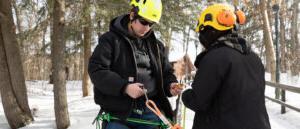It is impossible to overestimate the current and future importance of global water resource availability, security, and quality in terms of both ecosystem integrity and human health.
Natural Resources Conservation: Aquatic Resource Management Concentration Courses
 Water Law, Policy, and Regulation
Water Law, Policy, and Regulation
This course explores:
a) how and why U.S. water law and policy have changed over time including the influence of new stressors in the future
b) specific laws, policies, and regulations governing water allocation and conservation of water resources, and protection and restoration of riparian zones and floodplain, wetlands, and water quality
c) case studies showing successes, shortcomings, and lessons learned
Restoration of Aquatic Ecosystems
This course helps students develop the skills needed to:
a) define benchmark restoration conditions for aquatic/terrestrial transition zones (ATTZs)
b) identify the degree to which ecosystem structure and function of ATTZs have been lost
c) identify the effects of altered land cover on watershed process
d) develop short- and long-term management plans.
Assessment of Aquatic Resources
This course entails a scientific study of the physical, chemical, and biological attributes of water bodies (lakes, wetlands, and streams) to determine the level of potential impairment based on systematically collected data. This provides the student with the basic skills and knowledge to collect useful data typically required during the assessment phase of resource management efforts.
Information
Faculty + Staff
 We, the Faculty at Paul Smith’s College, strive to preserve an exceptional way of teaching and learning informed by the real work of humanity – to be environmentally and socially responsible to the planet and its people. Our way crosses all disciplines, explores connections, and expresses itself confidently in thoughts, words, and deeds. At the core of our experiential education, we hold these values to be indispensable: a) a deepened engagement with our students, it is real and in place; b) an integrated education that cultivates the student as a whole being in mind, body, heart, and soul; and c) the history, culture and environment of the Adirondacks as a place that speaks to our deeper sense of self and purpose. We strive to preserve our way and our values to be a universal example that connections of people with people and of people with environments is at the heart of education.
We, the Faculty at Paul Smith’s College, strive to preserve an exceptional way of teaching and learning informed by the real work of humanity – to be environmentally and socially responsible to the planet and its people. Our way crosses all disciplines, explores connections, and expresses itself confidently in thoughts, words, and deeds. At the core of our experiential education, we hold these values to be indispensable: a) a deepened engagement with our students, it is real and in place; b) an integrated education that cultivates the student as a whole being in mind, body, heart, and soul; and c) the history, culture and environment of the Adirondacks as a place that speaks to our deeper sense of self and purpose. We strive to preserve our way and our values to be a universal example that connections of people with people and of people with environments is at the heart of education.
